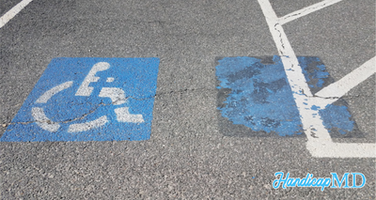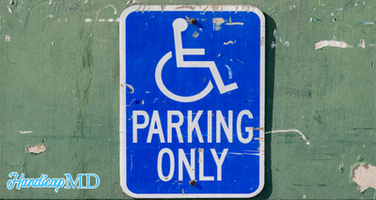
Disabled Parking Permit in Portland, ME: How to Obtain and Use a Handicap Parking Permit
Navigating life with a disability can be challenging, especially when it comes to accessibility and transportation. Disability tags, also known as handicap permits or disability parking permits, provide essential support by allowing individuals with disabilities to park in designated spaces close to entrances. In Portland, Maine, understanding the process of obtaining and using a disability tag can greatly improve mobility and accessibility. This guide offers an in-depth look at how to obtain and effectively use a disability tag in Portland, ME.
Understanding Disabled Parking Permits
A disability tag is a special permit issued to individuals who have medical conditions that limit their ability to walk or require the use of assistive devices. These tags are recognized by the Americans with Disabilities Act (ADA) and provide access to designated handicap parking spaces that are often closer to buildings and entrances.
The city disability tags are regulated by the Maine Bureau of Motor Vehicles (BMV). They come in two main forms:
- Placards: Removable signs hung from a car's rearview mirror.
- License Plates: Specially designed plates that indicate the vehicle owner has a disability.
Both options serve the same purpose and provide the same benefits, but the choice depends on individual preferences and needs
Eligibility Criteria
Eligibility for a disability tag is determined by Maine’s Bureau of Motor Vehicles (BMV) based on medical conditions that impair mobility or the ability to navigate public spaces. A licensed healthcare provider must certify the condition.
Who Qualifies for a Disability Tag?
Individuals are eligible if they have a condition that:
- Prevents them from walking more than 200 feet without rest or assistance.
- Requires the use of mobility aids such as a wheelchair, walker, crutches, cane, or prosthetics.
- Causes significant respiratory distress that limits physical activity or necessitates portable oxygen.
- Affects vision to the point of legal blindness or severe visual impairment.
- Involves a cardiac condition classified as Class III or IV by the American Heart Association.
- Results in limited mobility due to neurological or musculoskeletal conditions such as arthritis, Parkinson’s disease, or multiple sclerosis.
- Is temporary, such as a recovery from surgery, broken bones, or pregnancy complications that impair walking.
Healthcare Provider Certification
The condition must be certified by one of the following professionals:
- Licensed physician (MD or DO).
- Nurse practitioner (NP).
- Chiropractor (for specific conditions).
- Optometrist (for vision impairments).
Common Medical Conditions and Examples
Understanding the medical conditions that qualify can help determine eligibility for handicap permit. Below are examples of qualifying conditions:
1. Mobility Impairments
- Conditions: Severe arthritis, paralysis, leg amputation, or spinal injuries.
- Example: A person with severe arthritis who experiences joint pain and stiffness when walking short distances.
2. Respiratory Disorders
- Conditions: Chronic obstructive pulmonary disease (COPD), emphysema, or severe asthma.
- Example: An individual with emphysema who requires portable oxygen and experiences difficulty walking even moderate distances.
3. Cardiac Disorders
- Conditions: Congestive heart failure, angina, or arrhythmias.
- Example: A person with severe heart disease who becomes fatigued and breathless during mild exertion.
4. Vision Impairments
- Conditions: Legal blindness, glaucoma, or retinal degeneration.
- Example: A legally blind person who cannot safely navigate parking areas or crosswalks.
5. Neurological and Musculoskeletal Conditions
- Conditions: Multiple sclerosis, Parkinson’s disease, or severe back pain due to degenerative disc disease.
- Example: A person with Parkinson’s who experiences tremors and difficulty maintaining balance while walking.
6. Temporary Disabilities
- Conditions: Recovery from surgery, broken bones, or complications from pregnancy.
- Example: A person recovering from knee surgery who uses crutches and has limited mobility for several months.
Resources for Assistance
Maine Bureau of Motor Vehicles (BMV)
- Provides application forms, information on eligibility, and details about disability tag benefits.
Healthcare Providers
- Consult your doctor, nurse practitioner, or optometrist for certification of your medical condition.
Online Services
- Platforms like HandicapMD.com offer telehealth consultations and assistance with the application process, making it easier for those with mobility challenges.
Different Types of Disabled Permits Available in Portland
The city offers several types of disability tags to accommodate various needs:
1. Permanent Disability Tags
- Who It’s For: Individuals with long-term or permanent disabilities that impair mobility.
- Features:
- Blue tags issued by the state BMV.
- Valid for four years, with renewal required to maintain validity.
2. Temporary Disability Tags
- Who It’s For: Individuals with temporary disabilities expected to last six months or less.
- Features:
- Red tags issued for short-term use.
- Valid for up to six months and renewable with updated medical certification if the condition persists.
3. Disability License Plates
- Who It’s For: Individuals with permanent disabilities who own or frequently operate a vehicle.
- Features:
- License plates with the international wheelchair symbol.
- Valid as long as the vehicle registration is current.
4. Organizational Tags
- Who It’s For: Organizations or facilities that regularly transport individuals with disabilities, such as hospitals or senior centers.
- Features:
- Tags assigned to vehicles used exclusively for transporting disabled individuals.
Application Process
Applying for a handicap placard in Portland is a straightforward process. Here are the steps to ensure a successful application:
Step 1: Obtain the Application Form
- Download the Disability Plates/Placard Application (Form MV-134) from the Maine BMV website.
- Alternatively, pick up a copy at your nearest BMV office.
Step 2: Complete the Personal Information Section
- Provide your full name, address, contact information, and Maine driver’s license or state ID number.
- Indicate the type of tag you’re applying for (e.g., permanent tag, temporary tag, or license plate).
Step 3: Obtain Medical Certification
- Schedule an appointment with a licensed healthcare provider to complete the medical certification section of the application form.
- Ensure the provider includes details about your condition and signs the form to validate it.
Step 4: Submit the Application
- By Mail: Send the completed application, including any applicable fees, to the state's BMV address listed on the form.
- In Person: Visit your nearest BMV branch for faster processing.
- Online Services: Platforms like HandicapMD.com can assist with form submission and medical certification.
Step 5: Pay Applicable Fees
- Fees vary based on the type of tag:
- Permanent Tags: Free of charge.
- Temporary Tags: Free of charge.
- License Plates: Standard vehicle registration fees apply.
Step 6: Receive and Display Your Disability Tag
- Tags will be mailed to your address or issued at the BMV office.
- Display the tag on your rearview mirror when parked and remove it while driving.
- For license plates, ensure they are securely attached to your vehicle.
Fees
The fees for obtaining, renewing, or replacing city-issued disability tags are minimal and vary based on the type of tag:
1. Permanent Disability Passes
- Fee: Free of charge.
2. Temporary Disability Passes
- Fee: Free of charge.
3. Disability License Plates
- Fee: Standard vehicle registration fees apply. These fees are consistent with those for regular license plates in Maine.
4. Replacement Tags or Plates
- Fee: Typically free for tags. License plate replacements may incur a small administrative fee.
Validity and Expiration
The duration of validity depends on the type of disability tag issued:
1. Permanent Tags
- Validity: Valid for four years.
- Expiration: The expiration date is printed on the tag.
2. Temporary Tags
- Validity: Valid for up to six months.
- Expiration: The expiration date is indicated on the tag and cannot exceed six months.
3. Disability License Plates
- Validity: Valid as long as the vehicle registration is current.
- Expiration: Plates are renewed annually with the vehicle registration.
Renewal Process
Disability tags must be renewed before their expiration date to ensure continued access to accessible parking spaces. The renewal process varies based on the type of tag:
1. Permanent Tags
- When to Renew: Before the expiration date printed on the tag (every four years).
- Steps to Renew:
- Complete the renewal section of the Disability Plates/Placard Application (Form MV-134).
- Submit the form to the state's Bureau of Motor Vehicles (BMV) in person or by mail.
- Medical certification is not typically required for renewals unless requested by the BMV.
2. Temporary Tags
- When to Renew: If the disability persists beyond the original six-month validity.
- Steps to Renew:
- Obtain updated medical certification from a licensed healthcare provider.
- Submit a new application to the state BMV.
3. Disability License Plates
- When to Renew: Annually, as part of the vehicle registration renewal process.
- Steps to Renew:
- Renew your vehicle registration online, by mail, or in person at the state's BMV.
- Pay applicable registration fees.
Replacing Lost, Stolen, or Damaged Disabled Permits
If your disability tag is lost, stolen, or damaged, it’s important to replace it promptly to avoid disruptions in access to parking privileges.
Step 1: Report the Issue
- Stolen Tags: File a police report with your local law enforcement agency. A copy of the report may be required by the state BMV.
- Lost or Damaged Tags: No police report is necessary.
Step 2: Complete the Replacement Application
- Fill out the Disability Plates/Placard Application (Form MV-134). Indicate the reason for the replacement (e.g., lost, stolen, or damaged).
Step 3: Submit the Application
- Submit your completed form to the city's BMV:
- By Mail: Send the application to the address listed on the form.
- In Person: Visit a local BMV branch for quicker processing.
Step 4: Pay the Replacement Fee
- Replacement tags are typically free. Replacing a disability license plate may involve a nominal fee.
Step 5: Receive the Replacement
Once your application is processed and approved, your replacement tag or license plate will be issued.
Rules for Using Disabled Parking in Portland, ME
To legally use accessible parking spaces in the city, individuals must follow these rules:
1. Display a Valid Disability Tag
- A disability tag or license plate issued by the Maine Bureau of Motor Vehicles (BMV) must be properly displayed.
- Tags should be hung from the rearview mirror while parked and removed while driving.
2. The Tag Holder Must Be Present
- The person to whom the disability tag is issued must be in the vehicle, either as a driver or passenger.
- Misusing a tag, such as allowing others to use it without the individual present, is illegal and subject to penalties.
3. Respect Reserved Spaces
- Accessible parking spaces marked with the international wheelchair symbol are exclusively for vehicles with valid disability tags.
- Parking in these spaces without a tag is prohibited.
4. Avoid Blocking Access Aisles
- Striped access aisles adjacent to accessible parking spaces are reserved for wheelchair ramps and lifts. Parking or stopping in these areas is strictly prohibited.
5. Follow Time Limits
- Some accessible spaces may have posted time limits. Check signage for restrictions and adhere to them.
Regulations for Parking in Accessible Spaces in Portland
The city enforces strict regulations to ensure accessible parking spaces are used appropriately:
1. Markings and Signs
- Accessible spaces are clearly marked with the international wheelchair symbol on signs or painted on the pavement.
- Spaces may include additional signage indicating time limits or vehicle size restrictions.
2. Public and Private Properties
- Accessible parking regulations apply to public spaces (e.g., city streets and parks) and private parking lots (e.g., shopping centers and office complexes). Property owners are required to comply with the Americans with Disabilities Act (ADA) by providing a certain number of accessible spaces.
3. Temporary Tags
- Temporary disability tags are valid for parking in accessible spaces, provided they are current and displayed correctly.
Where Can You Park with a Handicap Placard in Portland?
A disability tag issued grants access to the following parking options:
1. Designated Accessible Parking Spaces
- Reserved spaces near building entrances, ramps, and elevators are marked for vehicles displaying a valid disability tag.
2. Metered Parking Spaces
- Vehicles with disability tags may park in metered spaces. The city allows free or extended parking at certain meters, but specific rules vary by location. Always check nearby signage for details.
3. Public Parking Lots and Garages
- Many city-owned parking lots and garages in the city have designated accessible spaces. Rules for free or discounted parking vary depending on the facility.
4. Statewide and Nationwide Access
- City-issued disability tags are valid throughout the state and in other states under the Americans with Disabilities Act (ADA).
Is Handicap Parking Free in Portland?
Free Parking Benefits
Vehicles with a valid disability tag often enjoy free parking at metered spaces. However, time limits may still apply, so check posted signage for restrictions.
Public and Private Lots
- Public Lots: Many city-owned lots waive fees for vehicles with disability tags, but this is not guaranteed at all locations.
- Private Lots and Garages: Fees for parking in private facilities typically apply unless explicitly waived by the property owner.
Extended Parking Allowances
The city allows vehicles with disability tags to exceed standard parking time limits at certain locations. Always verify local regulations to avoid fines.
Penalties for Misusing Accessible Parking Spaces
Misusing accessible parking spaces is not only inconsiderate but also subject to legal penalties. The purpose of these penalties is to ensure that individuals with disabilities have access to the accommodations they need.
Common Violations
Parking Without a Disability Tag
Parking in a designated accessible parking space without a valid disability tag is a clear violation of the law. These spaces are reserved exclusively for individuals with disabilities.Using Someone Else’s Disability Tag
Borrowing or using another person’s disability tag, even with their permission, is considered misuse. These tags are non-transferable and strictly for the individual they were issued to.Expired or Invalid Tags
Using a disability tag that is expired or was not issued by the appropriate authority is prohibited.Blocking Access Ramps or Loading Zones
Parking in areas designated for wheelchair ramps or loading/unloading zones for individuals with disabilities is a violation.
Consequences of Misuse
- Fines: Violators can face significant fines. In Portland, fines for unauthorized parking in accessible spaces typically range from $200 to $500, depending on the offense.
- Towing: Vehicles parked illegally in accessible spaces may be towed at the owner’s expense.
- Revocation of Tag: Misuse of a disability tag may result in its revocation and disqualification from future eligibility.
- Criminal Charges: Fraudulent use of a disability tag, such as forging documents or falsifying medical certifications, can result in criminal charges.
How to Display Your Disability Tag Correctly
Proper display of a disability tag is crucial for its validity and ensures compliance with state and local regulations.
For Placards
- Placement: Hang the tag from the rearview mirror when the vehicle is parked in a designated accessible space.
- Visibility: Ensure the tag is clearly visible from outside the vehicle, with the side displaying the expiration date facing forward.
- Removal While Driving: Remove the tag while driving to avoid obstructing the driver’s view. This is both a safety measure and a legal requirement.
For License Plates
- Disability license plates are permanently affixed to the vehicle and do not require any additional display actions.
- Keep the vehicle’s registration up-to-date, as failure to renew the plates may result in fines or invalidation.
Additional Tips
- Keep a copy of your disability tag documentation in your vehicle in case of any disputes or questions from law enforcement.
- Avoid altering or modifying the tag in any way, as this can invalidate it.
Using Your Portland Disabled Permit in Other States
Portland-issued disability tags are recognized across the United States under the Americans with Disabilities Act (ADA), which ensures uniform standards for accessible parking. However, regulations may vary slightly between states, so it’s important to be aware of local rules when traveling.
What to Know
Recognition Across States
City-issued disability tags are valid in all 50 states, as well as U.S. territories, under reciprocity agreements. Drivers can use their tags to access accessible parking spaces while traveling.Check Local Regulations
- Some states may have additional rules about time limits in accessible spaces.
- For example, metered parking exemptions for vehicles with disability tags may not apply in every state.
International Travel
- In some countries, U.S.-issued disability tags are accepted, but this is not guaranteed. Check the country’s regulations before traveling abroad.
Tips for Traveling With a Disability Tag
- Research the destination state’s parking laws for any differences in rules.
- Keep your disability tag documentation with you in case verification is needed.
- If using rental vehicles, inform the rental company about your disability tag to ensure compliance with local laws.
By understanding and adhering to these guidelines, you can ensure the proper and lawful use of your city-issued disability tag wherever you travel.
Frequently Asked Questions
1. Who is eligible for a disability tag?
Individuals with qualifying medical conditions that impair mobility or vision are eligible for a disability tag. These include:
- Difficulty walking more than 200 feet without rest or assistance.
- Reliance on mobility aids like wheelchairs, crutches, or walkers.
- Severe respiratory or cardiac conditions.
- Legal blindness or other significant visual impairments.
- Temporary disabilities, such as recovery from surgery or broken bones.
2. How do I apply for a disability tag?
To apply, complete the Disability Plates/Placard Application (Form MV-134) available from the Maine Bureau of Motor Vehicles (BMV). Have your healthcare provider certify your medical condition, then submit the form by mail or in person at your local BMV office.
3. What types of disability tags are available?
- Permanent Tags: For long-term disabilities, valid for four years.
- Temporary Tags: For short-term disabilities, valid for up to six months.
- Disability License Plates: For individuals with permanent disabilities who own or operate a vehicle.
4. Are there fees for obtaining a disability tag?
- Permanent and Temporary Tags: Free of charge.
- Disability License Plates: Standard vehicle registration fees apply.
5. Can I use my disability tag outside the city?
Yes, Maine-issued disability tags are valid statewide and in other states under the Americans with Disabilities Act (ADA). Be sure to check local regulations for specific rules on free or extended parking.
6. How do I replace a lost or stolen tag?
Complete a new application form and indicate the reason for replacement (e.g., lost or stolen). Submit it to the Maine BMV. Stolen tags may require a police report, but replacement fees are typically waived for tags.
7. Is handicap parking free in Portland?
Many metered parking spaces throughout the city offer free or extended parking for vehicles with a valid disability tag. However, time limits may apply, so check signage for specific restrictions.
Conclusion: Enhance Accessibility and Independence with a Disability Tag
Disability tags are invaluable tools for individuals who face challenges with mobility or vision. These permits provide access to reserved parking spaces, free or extended parking benefits, and compliance with the Americans with Disabilities Act (ADA).
By understanding the eligibility requirements and taking advantage of disability tags, you can navigate public spaces more easily and enjoy enhanced mobility.
Apply Through HandicapMD.com
Applying for a disability tag has never been easier! With HandicapMD.com, you can:
- Access a streamlined, online application process.
- Get assistance connecting with licensed healthcare providers for medical certification.
- Save time and avoid the hassle of in-person visits to the BMV.
.png)






